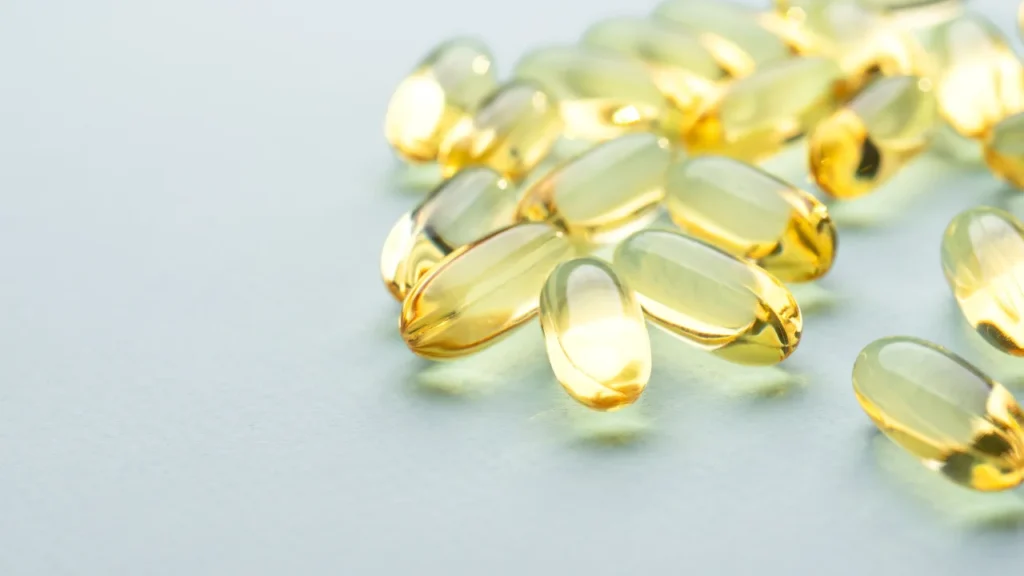A form of omega-3 fatty acid called eicosapentaenoic acid (EPA) can be found in fatty fish, fish oil, and algae, among other foods. Algae oil, made from particular kinds of algae, is one of the best sources of EPA. Because EPA is a polyunsaturated fatty acid, it possesses several double bonds throughout its chemical makeup. EPA has the chemical formula C20H30O2. EPA is well known for its many health advantages, which include raising productivity and focus levels, stimulating creativity, and enhancing sleep quality. In this post, we’ll examine the characteristics of EPA algae oil, its advantages for health, recommended dosage, possible adverse effects, possible drug interactions, and responsible usage.
You May Also Like:
Hypogammaglobulinemia: Description, Causes, and Treatment Protocol
Henoch-Schönlein purpura / IgA vasculitis: Description, Causes, and Treatment Protocol
Eicosapentaenoic acid (EPA) Algae Oil: Benefits, Dosage, Side Effects, Drug Interactions, And Other Important Information is an original (MedNewsPedia) article.
Nature of EPA Algae Oil
Certain varieties of algae are used to produce algal oil, which is cultivated in regulated circumstances to ensure purity and quality. One of the main omega-3 fatty acids included in algal oil is EPA. Algal oil is a more environmentally responsible and sustainable source of EPA than other sources, including fatty fish or fish oil. Other advantageous minerals, like astaxanthin or phytosterols, may also be present in some algal oil supplements, adding to their health benefits.
Health Benefits of EPA Algae Oil
EPA is well known for its host of health advantages, including raising productivity and focus levels, stimulating creativity, and enhancing sleep quality. Improving sleep quality is one of EPA’s main advantages. Melatonin, a hormone that controls sleep and wakefulness, has been proven to be produced more frequently when EPA is present. By enhancing melatonin generation, EPA can enhance sleep efficiency and help people fall asleep more quickly and stay asleep for longer.
EPA’s ability to improve concentration and productivity is a key additional benefit. EPA is a great option for people who want to focus better and be more productive at work or daily life because it can enhance cognitive function, memory, and attention. By increasing the blood and oxygen supply to the brain, which can improve neuronal activity and facilitate creative thinking, EPA may also encourage creativity.
Support mental clarity and enjoy peaceful nights with Omega-3 oil—Shop Today on Amazon!

Chemistry of EPA Algae Oil
Eicosapentaenoic acid (EPA) is an elongated polyunsaturated fatty acid with 20 carbon atoms and five conjugated double bonds. Its chemical name is C20H30O2. EPA is a highly concentrated form of the omega-3 fatty acid family and is found in both fish and algae. Algae oil is commonly used as a vegetarian or vegan alternative to fish oil since it is a plentiful source of EPA.

Physiological Mechanism of Action
EPA is a bioactive substance essential to a variety of bodily physiological processes. One of its main modes of operation is its anti-inflammatory qualities. By suppressing the production of pro-inflammatory molecules, including prostaglandins and cytokines, EPA reduces inflammation. This decrease in inflammation highlights the potential advantages of EPA in lowering the risk of chronic diseases like cancer, cardiovascular disease, and autoimmune disorders.
The effect of EPA on the brain’s neurotransmitter system is another remarkable aspect of its operation. Dopamine and serotonin are crucial neurotransmitters for controlling mood, cognition, and behavior, and EPA can increase their synthesis. Because it increases the production of neurotransmitters, EPA may improve focus, attention, and cognitive function.
Moreover, EPA promotes the production of neurotrophins, which are essential for developing and maintaining brain neurons. Neurotrophins serve a critical role in cognitive function and mental health and are necessary for the growth and upkeep of the nervous system. By boosting neurotrophin production, EPA can improve brain function and promote mental health.
EPA may also support cardiovascular health by reducing the risk of heart disease. It can lower triglyceride levels, blood pressure, and cholesterol profiles. Moreover, EPA may reduce the risk of developing an arrhythmia, a disease of the heart that may result in unexpected cardiac death.
In conclusion, EPA algae oil’s physiological mode of action includes its impact on anti-inflammatory processes, neurotransmitter functionality, neurotrophin production, and cardiovascular health. By influencing these pathways, EPA algae oil may bestow several health benefits and improve overall well-being.
Omega-3 oil improves focus and helps regulate sleep cycles naturally—Order Yours on Amazon Now!

Optimal Dosage of EPA Algae Oil
Age, gender, and general health are just a few variables that influence the ideal EPA algae oil dosage. Adults should strive to get at least 250–500 mg of EPA daily. Some people might need greater doses to get the most health advantages.
It’s crucial to take EPA algal oil supplements according to the manufacturer’s dosage recommendations. It is crucial to carefully read the label and consult a healthcare professional before taking any new supplements because some EPA supplements could contain additional components that could interfere with medications or have unwanted side effects.
Side Effects of EPA Algae Oil
Supplements containing EPA from algae are generally regarded as safe for most people. However, some individuals could experience adverse consequences like nausea, stomach discomfort, or diarrhea. Moreover, EPA supplements may conflict with some medicines, such as blood thinners, so seeing a doctor before using them is crucial.

Potential Substance Interactions with EPA Algae Oil
Supplemental EPA algae oil may interact with blood thinners and cholesterol-lowering drugs. Those who are on blood-thinning medications should refrain from using EPA supplements because they can also raise the risk of bleeding. Moreover, several supplements and herbs, like ginkgo biloba and vitamin E, may interact with EPA, so it’s vital to see a healthcare professional before taking any new supplements or drugs to prevent conflicts.
Best Responsible Uses of EPA Algae Oil
When purchasing EPA algal oil supplements, it’s crucial to get a top-notch item from a dependable supplier. Choose items that have undergone testing for quality and purity and are devoid of impurities like heavy metals or poisons.
Gamma Brain Luxury is one of the greatest EPA algae oil sources provided by Brain Luxury. This supplement contains other brain-boosting compounds like phosphatidylserine, Bacopa monnieri, and Ginkgo Biloba in a synergistic and highly bioavailable formulation. This product is an excellent option for people who want to better their mental performance and quality of life because it was specifically created to help cognitive function, increase focus and productivity, and foster creativity.
People should take medications as prescribed by the manufacturer, and if they have any concerns or questions, they should speak to a healthcare professional. Furthermore, it’s critical to understand that while EPA algal oil supplements may improve mental and physical health, they cannot replace a balanced diet and active lifestyle. A healthy lifestyle must include eating a balanced diet high in whole foods, frequently exercising, and getting enough sleep.
Individuals can take EPA algae oil supplements for a long time without experiencing any adverse effects, but it’s crucial to watch out for any possible drug interactions. It’s also critical to remember that EPA advantages can differ from person to person and can take some time to develop. To get the best results from any supplement, it is essential to utilize it consistently and patiently.
EPA Algae Oil:
Conclusion
EPA from algae oil offers numerous health benefits, particularly for cardiovascular, mental, and inflammatory health. Its anti-inflammatory properties, mood-enhancing effects, and contributions to heart and joint health make it a valuable addition to a healthy diet. As a sustainable and vegan source of omega-3 fatty acids, algae oil provides an excellent alternative to fish oil, ensuring that individuals can reap the health benefits of EPA without environmental or dietary restrictions. Incorporating EPA-rich algae oil into the diet can contribute to overall well-being and support various aspects of health.

References:
- What Is Algae Oil, and Why Do People Take It? Retrieved from: https://www.healthline.com/nutrition/algae-oil
- Bioavailability and potential uses of vegetarian sources of omega-3 fatty acids: a review of the literature. Retrieved from: https://pubmed.ncbi.nlm.nih.gov/24261532/
- Omega-3 fatty acids for nutrition and medicine: considering microalgae oil as a vegetarian source of EPA and DHA. Retrieved from: https://pubmed.ncbi.nlm.nih.gov/18220672/
- Algal oil alleviates antibiotic-induced intestinal inflammation by regulating gut microbiota and repairing intestinal barrier. Retrieved from: https://www.ncbi.nlm.nih.gov/pmc/articles/PMC9884693/
Important Note: The information contained in this article is for general informational purposes only, and should not be construed as health or medical advice, nor is it intended to diagnose, prevent, treat, or cure any disease or health condition. Before embarking on any diet, fitness regimen, or program of nutritional supplementation, it is advisable to consult your healthcare professional in order to determine its safety and probable efficacy in terms of your individual state of health.
Regarding Nutritional Supplements Or Other Non-Prescription Health Products: If any nutritional supplements or other non-prescription health products are mentioned in the foregoing article, any claims or statements made about them have not been evaluated by the U.S. Food and Drug Administration, and such nutritional supplements or other health products are not intended to diagnose, treat, cure, or prevent any disease.


